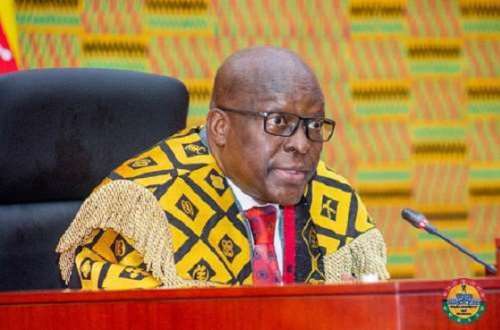The Speaker of Parliament, Alban Sumana Bagbin, has submitted an application to the Supreme Court, requesting the reversal of its decision that suspended the Speaker’s ruling and declared four parliamentary seats vacant.
Furthermore, the Speaker is seeking an order from the court to annul the writ filed by the Majority Leader, Alexander Afenyo-Markin, which aimed to prevent the Speaker from making any determinations regarding the aforementioned seats.
In the application, filed today by his legal representative, Thaddeus Sory, the Speaker argues that the Supreme Court misapplied the law by staying the execution of his ruling, asserting that it constitutes a non-judicial decision. According to the Speaker, the Supreme Court possesses the authority to suspend rulings issued by itself or by lower courts within the judicial hierarchy; however, this authority should not extend to decisions made by the Speaker of Parliament, who is not a part of the judicial framework.
The motion states, “In terms of orders to stay the execution of rulings, the Supreme Court’s powers, as delineated in the 1992 Constitution of the Republic of Ghana and relevant statutes, are confined to rulings it has issued and those of courts subordinate to it. Such powers do not apply to the rulings of the Speaker of Parliament, as these do not fall within the judicial hierarchy.”
Another basis for the Speaker’s application is the assertion that the Supreme Court violated the principle of natural justice by granting a stay of his ruling through an ex parte application, thereby denying him an opportunity for a hearing. The Speaker contends that ex parte applications should only be considered under exceptional circumstances, which are not present in this case.
He noted, “Given the context in which the Court issued the order, there was no justifiable reason to deny the first Defendant a hearing, particularly considering that the Court was aware that the next session of Parliament was scheduled for Tuesday, October 22, 2024. The Court could have facilitated a hearing for the first Defendant on the preceding day, Monday, October 21, 2024.”
Regarding the writ submitted by Mr. Afenyo-Markin, the Speaker argued that it is fundamentally flawed, as it does not adhere to established court rules and fails to appropriately invoke the jurisdiction of the court for the interpretation or enforcement of the 1992 Constitution. He asserted that Articles 97(1)(g) and (h), which underpin the Speaker’s ruling, are explicit and unequivocal, thus rendering unnecessary any constitutional interpretation by the court.
The application states, “The language utilized in Articles 97(1)(g) and (h) of the Constitution is clear, unambiguous, and without contention. No justification exists within the filed processes to suggest a dispute regarding their interpretation.”
The provisions indicate that a Member of Parliament vacates their seat when they depart from the political party under whose ticket they were elected to either join another party or become an Independent Member of Parliament, or when an Independent Member of Parliament subsequently aligns with a political party.The Speaker of Parliament, Alban Sumana Bagbin, has submitted an application to the Supreme Court, requesting the reversal of its decision that suspended the Speaker’s ruling and declared four parliamentary seats vacant. Furthermore, the Speaker is seeking an order from the court to annul the writ filed by the Majority Leader, Alexander Afenyo-Markin, which aimed to prevent the Speaker from making any determinations regarding the aforementioned seats.
In the application, filed today by his legal representative, Thaddeus Sory, the Speaker argues that the Supreme Court misapplied the law by staying the execution of his ruling, asserting that it constitutes a non-judicial decision. According to the Speaker, the Supreme Court possesses the authority to suspend rulings issued by itself or by lower courts within the judicial hierarchy; however, this authority should not extend to decisions made by the Speaker of Parliament, who is not a part of the judicial framework.
The motion states, “In terms of orders to stay the execution of rulings, the Supreme Court’s powers, as delineated in the 1992 Constitution of the Republic of Ghana and relevant statutes, are confined to rulings it has issued and those of courts subordinate to it. Such powers do not apply to the rulings of the Speaker of Parliament, as these do not fall within the judicial hierarchy.”
Another basis for the Speaker’s application is the assertion that the Supreme Court violated the principle of natural justice by granting a stay of his ruling through an ex parte application, thereby denying him an opportunity for a hearing. The Speaker contends that ex parte applications should only be considered under exceptional circumstances, which are not present in this case.
He noted, “Given the context in which the Court issued the order, there was no justifiable reason to deny the first Defendant a hearing, particularly considering that the Court was aware that the next session of Parliament was scheduled for Tuesday, October 22, 2024. The Court could have facilitated a hearing for the first Defendant on the preceding day, Monday, October 21, 2024.”
Regarding the writ submitted by Mr. Afenyo-Markin, the Speaker argued that it is fundamentally flawed, as it does not adhere to established court rules and fails to appropriately invoke the jurisdiction of the court for the interpretation or enforcement of the 1992 Constitution. He asserted that Articles 97(1)(g) and (h), which underpin the Speaker’s ruling, are explicit and unequivocal, thus rendering unnecessary any constitutional interpretation by the court.
The application states, “The language utilized in Articles 97(1)(g) and (h) of the Constitution is clear, unambiguous, and without contention. No justification exists within the filed processes to suggest a dispute regarding their interpretation.”
The provisions indicate that a Member of Parliament vacates their seat when they depart from the political party under whose ticket they were elected to either join another party or become an Independent Member of Parliament, or when an Independent Member of Parliament subsequently aligns with a political party.



